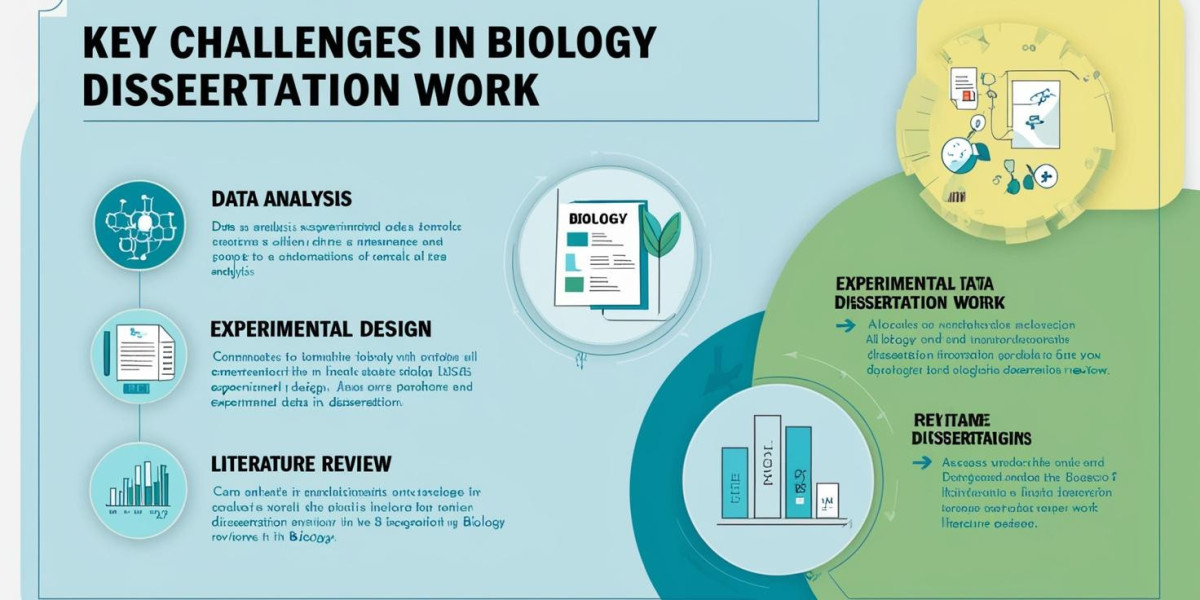Writing a biology dissertation is no easy feat. The process is long, complicated, and often feels like it's never gonna end. Students in this field face a number of challenges, and let’s be real—it can be overwhelming at times. But hey, that's what makes the journey worthwhile, right? If you’re feeling stuck or frustrated, you're definitely not alone.
Whether you’re knee-deep in research or just starting to brainstorm, it’s helpful to understand some of the major roadblocks students face. This article will break down the most common challenges and offer practical tips for handling them. Plus, we’ll also mention Biology Dissertation Help when things get a bit too tough to handle on your own. So, let’s dive in.
1. Choosing the Right Topic
Let’s start with the basics—picking a topic. This might sound like an obvious step, but trust me, it's trickier than it sounds. Biology is such a broad field, and narrowing it down to one specific research question can be daunting. You gotta think about what interests you, what’s feasible in terms of resources, and what’s relevant to current research trends.
For some students, the struggle is real. They end up picking something too broad, like "The Effect of Climate Change on Ecosystems." While that’s an important issue, it's also so huge that tackling it in a dissertation could be a nightmare. On the other hand, a topic that’s too narrow, like "The Impact of Temperature Changes on the Growth of Algae in a Specific Pond," might make for interesting research, but good luck finding enough sources or relevant data.
The best way to avoid this headache? Research the heck outta potential topics before you settle on one. Ask your professors, look at recent publications, and see what sparks your curiosity. When in doubt, Biology Dissertation Help services can point you in the right direction.
2. Gathering Data
Once you've got your topic, you’re gonna need data. And depending on your research area, getting accurate, reliable data can be tough. Whether you're doing lab work, field research, or using secondary data from published studies, there are bound to be some obstacles.
If you’re doing experimental work, you could face challenges like equipment malfunction, limited access to lab space, or, let's face it, sheer exhaustion from the grind of long hours. Fieldwork has its own set of challenges, like unpredictable weather, difficulty accessing sites, and the need for a ton of patience. Not to mention, working with living organisms (plants, animals, or microbes) introduces all sorts of variables that can’t always be controlled.
Then, there’s the issue of data quality. It’s easy to get a bunch of numbers and stats, but are they meaningful? Do they make sense in the context of your research? How do you know your data isn’t tainted or biased? These questions are tough, and the pressure to get everything right can be overwhelming. But hey, it’s part of the game.
For students struggling to gather solid data, reaching out for Biology Dissertation Help can save you a ton of time and stress. Experienced writers can guide you in structuring your data collection methods or offer advice on how to present your findings in a clear and logical way.
3. Time Management
Ah, time management. If you’re anything like me, you probably think you’re good at juggling tasks, but a dissertation will put that to the test. Biology dissertations require months (sometimes even years) of research, writing, and revision. It’s easy to lose track of deadlines, get bogged down in data analysis, or procrastinate when the end goal seems too far away.
One of the hardest things about writing a dissertation is pacing yourself. You can’t rush it, but you also can’t put it off forever. Creating a schedule and sticking to it is critical, even if it feels impossible at times. Break the whole process down into manageable chunks, and don’t let yourself get distracted by non-dissertation stuff. (Seriously, stop watching cat videos on YouTube when you should be writing.)
Time management is a huge issue for students, and when you’re stuck in a cycle of endless revisions or procrastination, Biology Dissertation Help can give you the structure and support you need to stay on track.
4. Writing and Structuring the Dissertation
Ah, writing. The dreaded part. For some students, the hardest challenge isn’t the research or data collection—it’s the actual process of writing everything down in a clear and coherent way. Biology is a technical field, and your dissertation needs to reflect that. But that doesn’t mean it has to be all jargon and no personality.
Writing a dissertation isn’t just about presenting information; it’s about telling a story. You need to present your research question, describe your methods, explain your results, and interpret your findings in a way that others can understand. Each section has a specific purpose, and you need to make sure everything flows logically.
But even if you're a natural writer, the sheer length of a dissertation can be daunting. How do you stay motivated to write hundreds of pages? How do you make sure your work doesn’t turn into an endless stream of rambling sentences?
Here’s a tip: don’t aim for perfection right away. Start with a rough draft and get all your ideas down. Then, go back and revise it. You’ll find that your thoughts evolve as you write, and that’s totally okay. Still, if you find yourself struggling with the writing process, Biology Dissertation Help can be a lifesaver. Professional writers can help organize your thoughts and structure your dissertation so it makes sense.
5. Dealing with Writer’s Block
We’ve all been there: staring at a blank screen, wondering why on earth you ever thought you could finish a dissertation. Writer’s block is a serious issue, and it can paralyze your progress for days or even weeks. It’s like being stuck in quicksand—you try to move, but you just sink deeper.
Sometimes, all it takes to break the block is a change of scenery or a fresh approach to your topic. If you're constantly thinking about your dissertation in the same way, you're bound to hit a wall. Try discussing your ideas with classmates, professors, or even family members. A new perspective can help spark creativity and get the words flowing again.
But if you're still stuck, don't feel bad about asking for help. Biology Dissertation Help services can provide tailored assistance, whether you need a few sections rewritten or someone to help you push through the tough spots. Having that extra support can make a world of difference.
6. Maintaining Motivation
Let’s face it—writing a dissertation takes forever. Motivation can be hard to come by when you’re in the thick of it. You’re constantly thinking about all the work ahead, and sometimes it feels like you’re never going to finish. But here’s the thing: staying motivated is key to getting to the finish line.
One trick is to celebrate small wins. Finished your literature review? Take a break and treat yourself. Wrapped up a big chunk of data analysis? Awesome, you’re one step closer. It’s these small victories that will keep you going when you’re tempted to throw in the towel.
Don’t forget about self-care, either. It’s easy to fall into a cycle of stress and burnout when you're constantly working. Take regular breaks, go for walks, and make sure you're getting enough sleep. A well-rested mind is far more productive than one that’s been running on empty for days.
But if your motivation is still waning, you might want to consider turning to Biology Dissertation Help. They can offer guidance on how to tackle specific sections, which might reignite your drive and help you push through the tougher parts of your dissertation.
7. Final Revisions and Editing
After months (or years) of hard work, it’s finally time to revise and edit your dissertation. Sounds easy, right? Well, not so fast. After spending so much time working on your paper, it can be hard to see the flaws. You’re so close to the material that you might miss inconsistencies, awkward phrasing, or missing citations.
Take a step back and give yourself a break before you dive into the final revisions. This will help you see your work with fresh eyes. You might even want to ask a peer, professor, or editor to review your dissertation for you. A second set of eyes can help catch mistakes you might have missed.
And if you feel like you’re still missing something or struggling to polish your work, Biology Dissertation Help services can step in to give your dissertation that final touch. Professional editors can help you fine-tune your writing and ensure that everything is up to academic standards.
Final Thoughts
Writing a biology dissertation is a big challenge, but it's also an incredible opportunity to dive deep into a topic you're passionate about. From choosing the right topic to collecting data, managing your time, and writing your dissertation, the journey is full of hurdles. But with the right tools, resources, and support—like Biology Dissertation Help—you can overcome these challenges and produce a dissertation that you’ll be proud of.
Read More-Data Analysis in Business Dissertations









